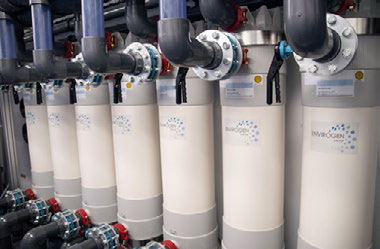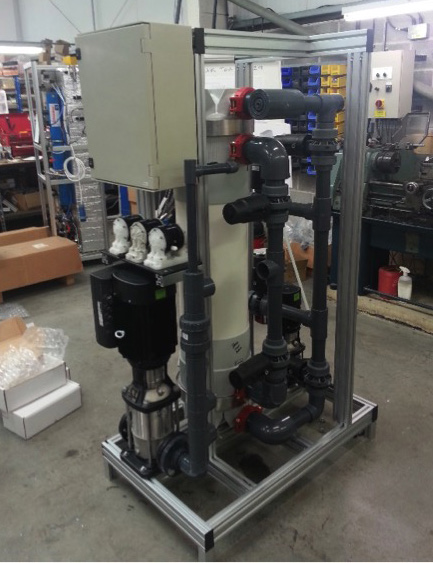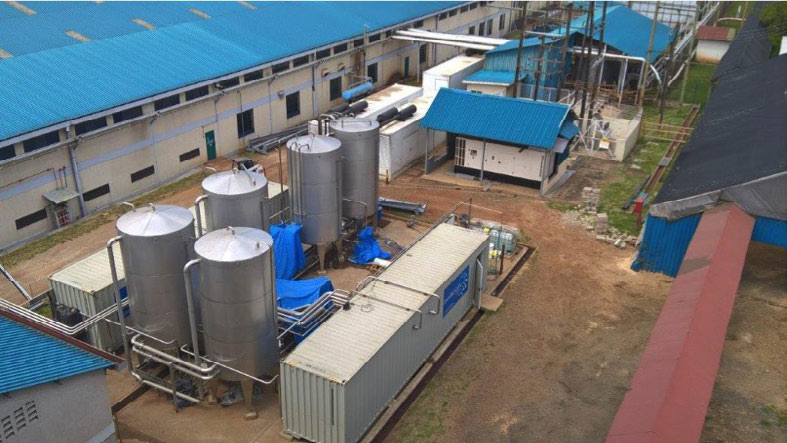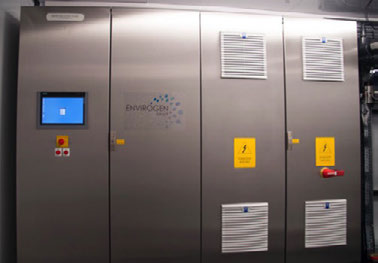Maintaining a reliable and sustainable water supply is one of the key challenges for beverage producers, especially when downstream processing takes place at production sites. A bespoke water recycling system, designed and built in the UK, is recycling 65% of process water at one producer’s African site, directly resulting in an innovative new green tea.
The producer is one of the world’s largest suppliers of tea and tea extracts. When an opportunity the project. To grow the operations on site, the producer would need to recycle at least 55% of the water used in blanching, a process used to decaffeinate the tea, to meet both the demand and to comply with water supply restrictions.

A bespoke solution to a unique problem
Producing a high-quality, naturally decaffeinated, green tea requires blanching the leaves with hot water at around 86°C. To maintain the fresh taste of the tea, the process needs to happen within a few hours of the leaves being picked, so it must done on site. Blanching is a very water-intensive process, and in a country where water is scarce and pollution is common, the lack of water can be a serious limiting factor that can easily halt operations.”
“Our client was keen to grow and supply an innovative tea extract product for its customer,” explains Bill Denyer, CEO Europe at Envirogen Group.”
“The brand specialises in harnessing the goodness, flavour and fragrance of the tea, but are only willing to grow and process new products if they are able to do this with minimal impact on the surrounding water supply and if they can demonstrate a sustainable model for ongoing work.”
“Tea can be a tricky substance to work with when it comes to water recycling systems,” continues Denyer. “Wastewater from the blanching process is high in organic and solid matter so you need to perform staged filtering to achieve the highest water quality and prevent any blockage to the end-stage process. The client uses a unique process to achieve extremely high standards in its tea extracts and so it was only right that the water recovery and water recycling system be tailor-made to fit the operation’s bespoke systems.”
“So we could design the optimum water recycling system solution, we completed a benchtop trial on a 25-litre sample of wastewater at our research and manufacturing centre in the UK. We wanted to ensure that the solid matter could be extracted without excessive back-pulsing, or the water efficiency saving would be reduced through this regeneration activity. We took a set of effluent samples for analysis and assessed the potential solutions available to enable efficient water recovery. Once we were happy that our clients’ goals could be met, we ran a 10% pilot study on site in East Africa. Producing a scaled plant at the production location was beneficial to both the management teams and the engineering and operational teams based at site. They were able to sign off on both the design and the quality of recycled water being produced.”
The solution
Hot wastewater is collected directly from the blanching process and is run through a coarse filter to remove the bulk of large solid matter. This resulting liquid is then passed through a heat exchanger to reduce the temperature ready for ultrafiltration. The latent heat extracted is used to increase the temperature of the recycled permeate output which is fed back into the blanching process, delivering an additional cost saving through heat recycling.
The cooled water then passes into an ultrafiltration system consisting of two banks of eight membranes. Each bank of membranes is run in isolation with a separate centrifugal pump, delivering continuous operation during regeneration and maintenance cycles. The ultrafiltration stage removes smaller solid and organic matter to preserve the integrity of the next stage of the process. The permeate is then stored in a tank ready for the final stage of purification.
Reverse osmosis semi-permeable membranes are used to provide a sterile barrier to separate the water from other dissolved elements ready for re-use. These dissolved salts, chemicals and odour or taste tainting chemicals are removed to produce purified water suitable for reuse within the decaffeination process.

Single Ultra Filtration (UF) rig used for the on-site trail
Exceeding expectations – recycling 65% of wastewater and lowering heating costs
The client is pleased with Envirogen’s approach to solving this problem, highlighting that:
“Envirogen Group is clearly experienced at providing solutions to complex manufacturing challenges. Building, testing and commissioning the system in the UK ready to use before delivery to site was a real bonus. It reduced the time taken for installation and testing on site and minimised disruption to our day to day activities. We had a dedicated Envirogen team on our East African site to ensure that the equipment was installed correctly, both mechanically and electrically, in partnership with our team here and a third-party plumbing company. A 20-hour performance test, run by Envirogen, proved the effectiveness of the system and the team didn’t leave until we were happy that the system was performing as expected and the operators were comfortable using the control systems.”
“The Envirogen support team can access the data and systems remotely, so we have support whenever we need it. That was especially helpful in the first few weeks of operation so the team could ask questions and check data when needed.”
“The highlight of this project is the outcomes that we are seeing. We wanted to achieve a water saving rate of 55% and the water recycling system delivers 65%, which far exceeds our expectations. But not only are we saving water, we are also saving on our heating charges as the energy extracted by the heat exchanger is being used to heat the incoming and recycled water needed for the blanching process.”
“The water recycling system is helping us to achieve our high sustainability targets. We want to have as little impact as possible on the environment surrounding our farms and processing plants, and saving water is an important element in this. Simply put, without this recycling plant it just wouldn’t be possible for us to supply this new product to market.”


The site during build and commissioning – including install of two fully containerised water treatment plant systems
Key outcomes
- Water recycling system achieved rates of 65%, meeting the client’s objectives to minimise the impact of their site on the surrounding water supply and provide a sustainable model for ongoing growth
- Additional heat recycled into the blanching process, saving money on heating bills
- Resolution of complex supply problems means this global beverage brand can develop its new product and extend the market
- Minimal impact on site – with systems built, tested and commissioned in the UK before shipping to East Africa
For a free assessment to evaluate water treatment and process filtration solutions for your site, contact our team of expert engineers
About the client
The producer is one of the world’s largest independent providers of high quality tea extracts and aromas. Their global extraction facilities can produce an extensive portfolio of products suiting different applications and markets.
